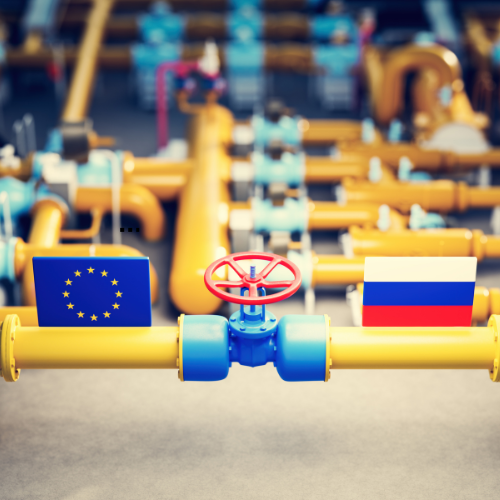This week the EU Commission announced (click here) plans to halt all remaining energy imports from Russia into the EU.
What is it about?
- Since the start of the Russia-Ukraine war in 2022, the EU has significantly reduced its imports of Russian energy, but stopped short of banning them altogether. This week the EU Commission laid the groundwork to do just this. According to this speech by the EU Commissioner for energy and housing, in 2024 three percent of the EU’s oil supply and 13 percent of its gas supply originated from Russia (although Russian coal imports have dropped to zero). According to the Commissioner, in 2024 the EU paid EUR 23 billion to Russia for its energy imports – a situation which the EU Commission believes must cease. Enter the so-called “REPowerEU Roadmap” roadmap adopted by the EU Commission this week which sets out a plan to “finish the job”;
- The EU’s plans cover Russian gas, nuclear energy and oil. EU member states will be asked to prepare national plans by the end of 2025 setting out how they will contribute to the phasing out. For gas, new contracts with suppliers of Russian gas (pipeline and LNG) will be banned, and existing spot contracts will be stopped by the end of 2025. This is expected to reduce supply by one third with the remaining two thirds being phased out by the end of 2027. New rules on transparency, monitoring and traceability of Russian gas will also be introduced. For oil, the focus will be on preventing Russian oil entering the EU via Russia's “shadow fleet”. Actions will include the surveillance and monitoring of maritime activities to identify suspicious vessels and behaviours. For nuclear, new restrictions will be introduced to phase out imports of Russian uranium, enriched uranium and other nuclear materials;
- The EU Commission’s 18-page “Roadmap towards ending Russian energy imports” maybe found here. The document lays out nine actions needed to phase out Russian energy imports (see below). The roadmap will be followed by legislative proposals by the EU Commission in June. According to this Q&A published by the EU Commission, the phase out will be done gradually over time and in a coordinated manner with EU Member States to help minimise the impact on prices, to help stabilise markets through secure alternative supplies and to provide legal certainty.
The nine actions outlined in the EU Commission’s Roadmap are summarised below:
Action 1: Transparency, monitoring and traceability (Pipeline gas and LNG):
- Existing EU legislation already contributed to more transparency and traceability of gas imports to the EU, but the information is not granular enough;
- The EU Commission will propose measures necessary for more effective monitoring and traceability;
- One measure would require companies to provide information on Russian gas contracts (e.g. volumes, duration etc.) to Member States’ relevant authorities and to the EU Commission;
- Another action will ensure that information on actual imports of Russian gas is shared among customs, national energy and security authorities, and the EU Commission.
Action 2: National plans to support EU action to phase out Russian gas (Pipeline gas and LNG):
- The EU Commission will propose legislation requiring Member States to plan and monitor the EU-wide phase out of Russian gas;
- National plans will need to lay out:
- The volume of Russian gas imports under existing contracts, including for contracts with take or-pay clauses;
- A timeline, including milestones supporting EU measures to achieve the objective of phasing out Russian gas;
- Diversification options and technical capabilities to replace Russian gas, including through cooperation in existing regional groups.
- Working and coordination groups, such as the Gas Coordination Group, or a dedicated subgroup as well as regional groups will help support Member States in the preparation of the plans.
Action 3: Stepwise prohibition of Russian gas imports (Pipeline gas and LNG):
- The EU Commission intends to propose legal measures for the effective phase out of gas imports from Russia;
- Provided the phase out is gradual and alternative supplies are ensured, the prohibition of Russian gas imports is expected to have a limited impact on prices and on security of supply (page nine provides several points justifying the EU Commission’s position);
- The EU Commission will ensure that the measures to halt Russian gas imports will be designed in a way that minimises economic impact on market participants, and is in full compliance with EU law and obligations under international law.
a. Prohibition of imports under new contracts and existing spot contracts on Russian gas:
- Since spot contracts involve a less significant part of the overall volumes and involve short-term deliveries, phasing out the corresponding volumes is possible within a relatively shorter time frame;
- The prohibition should take effect by the end of 2025 at the latest.
b. Prohibition of imports of Russian gas under existing long-term contracts
- The Commission intends to propose measures next month to ban the remaining imports of Russian gas comprising those falling under existing long-term contracts (both pipeline and LNG);
- The phase out of these imports requires a longer transition time due to the larger volumes for affected importers but will take effect no later than the end of 2027.
Action 4: Supporting diversification by demand aggregation and better use of infrastructure:
- Securing alternative supplies from reliable partners is critical to limiting any market or security of supply impact;
- The EUCommission will continue its discussions with reliable suppliers and will substantially step upits energy cooperation with partner countries in the Middle East, Northern Africa, around the Black Sea, and through the EU’s Global Gateway (click here);
- Alternatives to natural gas imports will continue to be developed in parallel where possible including via electrification and by boosting the production of biogas, biomethane and clean hydrogen in line with REPowerEU;
- Options going beyond demand aggregation (such as the AggregateEU scheme for centralised gas procurement) will also be explored including the feasibility of a platform to support the scale-up and trade of gaseous molecules of non-fossil origin, including biomethane.
Action 5: New restrictions to phase out Russian imports of uranium, enriched uranium and other nuclear materials (Nuclear):
- Unlike the gas sector, dependencies in the nuclear sector are multi-facetted and security of supply risks may still arise in the short to medium term in the case of sudden policy changes (i.e. it will take longer to ban such imports);
- The purpose of this action is to support a gradual phasing out of the supply from Russia of uranium, enriched uranium and other nuclear materials.
- Measures on enriched uranium
- The EU Commission wants to make Russian imports of enriched uranium economically less viable by employing “trade measures” on the import of enriched uranium;
- This will “level the playing field” and encourage political and business decisions in the relevant Member States to accelerate investment in local supply chains and the use of supplies from other international partners.
- Restrictions on contracts co-signed by the Euratom Supply Agency
- The EU Commission will restrict new supply contracts co-signed by the Euratom Supply Agency for uranium, enriched uranium and other nuclear materials with Russian suppliers as of a certain future date;
- Deliveries based on existing contracts will continue but extensions as well as new supply contracts will no longer be approved by the Euratom Supply Agency.
Action 6: Diversification obligation and transparency: national plans to phase out Russian nuclear supplies (Nuclear):
- The Commission will seek systematic action from Member States to phase out supplies of nuclear fuel, fuel services and spare parts from Russia and to replace them including, over time,with fully European alternatives;
- The EU Commission intends to make a legislative proposal with specific targets for Member States to:
- Replace Russian nuclear fuels with alternative fuels by accelerating the contracting and licensing of such fuels and developing further fully European alternatives;
- Phase out reliance on Russia for uranium, enriched uranium and other nuclear materials;
- Increase transparency on dependencies and encourage diversification of Russian supplies of spare parts and maintenance services.
Action 7: Ramping-up EU production: Proposal for a European Radioisotopes Valley Initiative (ERVI) (Nuclear):
- The Commission will propose the creation of an EU structure to secure EU supply of medical radioisotopes through increased own production.
Action 8: National plans to phase out Russian oil and ensure alternative supplies (Oil):
- The EU Commission recommends that the two concerned Member States plan and monitor the phase out of oil imports from Russia as the EU Commission intends to propose an obligation for them to do so.
- The Member States concerned would be required to draft and submit their national plans outlining their strategies for replacing Russian oil imports by the end of 2027 with:
- A timeline with milestones to achieve the objective of phasing out Russian oil;
- Diversification options and technical capabilities to replace Russian oil;
- The volume of Russian oil imports under existing contracts, and their expiry.
- The EU Commission intends to present the legislative proposal next month on national plans to phase out remaining Russian oil imports, and recommends that concerned Member States already submit their first national plans in by the end of 2025.
Action 9: Continue imposing and enforcing sanctions on entities and vessels suspected of illicit activities (Oil):
- The following actions are envisaged to address the problem of circumvention of Russian oil sanctions by using “shadow fleets”:
- Continue outreach and dialogue with concerned third countries;
- Work with international partners, including with the International Maritime Organization (IMO), to establish and uphold stringent maritime safety and security standards;
- Encourage Member States to enhance maritime surveillance, building on the integrated services hosted in the European Maritime Safety Agency;
- High Representative will explore with the Member States the deployment of an EU Common Security and Defence Policy mission to conduct surveillance of maritime activities to identify suspicious vessels or behaviours and in deterring illegal maritime activities;
- Enforcing international maritime law including by requesting the Flag State of a suspicious vessel to take all necessary measures if the vessel enters the territorial sea of a that state;
- Boarding and inspecting vessels of interest in the high seas or in the exclusive economic zones of EU Member States;
- Conclude agreements with concerned Flag States to secure their consent for pre-authorized boarding operations on the high seas or in the exclusive economic zones of EU Member States.
.png)

